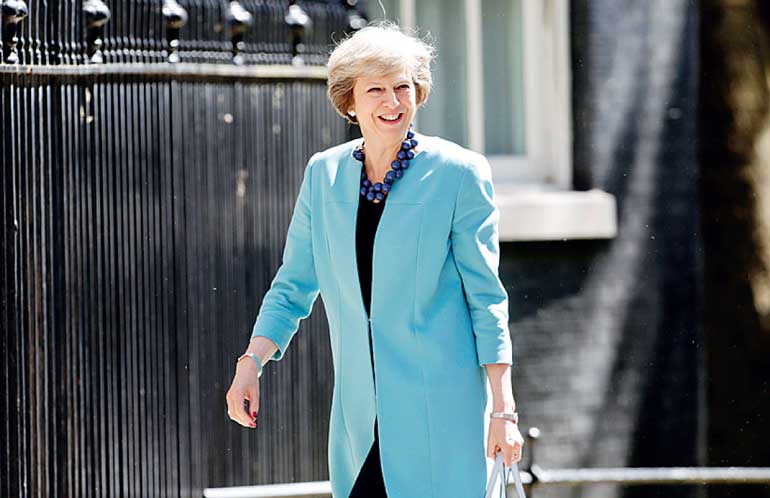Friday Feb 20, 2026
Friday Feb 20, 2026
Friday, 15 July 2016 00:00 - - {{hitsCtrl.values.hits}}
 Britain’s Prime Minister Theresa May arrives at 10 Downing Street, in central London July 14, 2016. REUTERS
Britain’s Prime Minister Theresa May arrives at 10 Downing Street, in central London July 14, 2016. REUTERS
Reuters: Theresa May became Britain’s prime minister on Wednesday with the task of leading it out of the European Union, and quickly named leading ‘Brexit’ supporters including former London mayor Boris Johnson to key positions in her new government.
The former Conservative interior minister, 59, said after being appointed by Queen Elizabeth that she would champion social justice and carve out a bright new future for Britain after last month’s shock referendum vote to quit the EU.
“We will rise to the challenge. As we leave the European Union we will forge a bold new positive role for ourselves in the world, and we will make Britain a country that works not for a privileged few, but for every one of us,” she said outside 10 Downing Street, vacated hours earlier by David Cameron.
Cameron stepped down after Britons rejected his entreaties to stay in the EU, a decision that has set back European efforts to forge greater unity and created huge uncertainty in Britain and across the 28-nation bloc.
May faced immediate pressure from EU leaders to serve formal notice of Britain’s withdrawal and set the clock ticking on a two-year countdown to its final departure.
In phone calls with German Chancellor Angela Merkel and French President Francois Hollande, May said she needed time.
“On all the phone calls, the prime minister emphasised her commitment to delivering the will of the British people to leave the European Union,” a spokeswoman for May said.
“The prime minister explained that we would need some time to prepare for these negotiations and spoke of her hope that these could be conducted in a constructive and positive spirit.”
Just over an hour after entering her new office, she started naming ministers, appointing the steady and experienced foreign minister Philip Hammond to take charge of the finance ministry. He replaces George Osborne, whose determination to balance Britain’s books made him synonymous with austerity.
In a major surprise, May named Johnson, a leading eurosceptic who had until recently been seen as her main rival for the prime minister’s job, to take over as foreign secretary.
Other prominent ‘Leave’ campaigners were also rewarded. One, David Davis, took the key role of Secretary of State for Exiting the European Union. Another, Liam Fox, was named to head a new international trade department.
May herself had sided with Cameron in trying to keep Britain inside the EU, so needed to reach out to the winning Leave side in order to heal divisions in the ruling party and show her commitment to respecting the popular vote. “Brexit means Brexit” has quickly become her new mantra.
By awarding such a senior job to Johnson, she also showed a conciliatory side. The two had clashed over policing in London while Johnson was serving as mayor. And since last month’s vote, for which he campaigned vigorously, Johnson had suffered widespread criticism and ridicule for failing to present a clear Brexit plan and swiftly dropping out of the leadership race.
With his unkempt blonde hair, bumbling humour and penchant for Latin quotations, the man known to Britons simply as ‘Boris’ will be the government’s most colourful figure, but a controversial choice for conducting sensitive diplomacy with world leaders.
Asked by a reporter whether he would apologise to US President Barack Obama for controversially saying the “part-Kenyan” president was biased against Britain because of “an ancestral dislike of the British empire”, Johnson said: “The United States of America will be in the front of the queue.”
The quip was a reference to a comment by Obama during Britain’s EU referendum campaign that the country would be at the back of the queue for trade deals if it voted to leave the bloc.
Among other appointments, rising star Amber Rudd switched from the energy ministry to take May’s old job as Home Secretary.
May is Queen Elizabeth’s 13th prime minister in a line that started with Winston Churchill. An official photograph showed her curtseying to the smiling monarch. She is also Britain’s second female head of government after Margaret Thatcher.
Reuters: The Bank of England kept interest rates unchanged on Thursday, wrong-footing many investors who had expected the first cut in more than seven years as Britain’s economy reels from last month’s Brexit vote.
The Bank said it was likely to deliver stimulus in three weeks’ time, possibly as a “package of measures” once it has assessed how the 23 June referendum decision to leave the European Union has affected the economy.
“In the absence of a further worsening in the trade-off between supporting growth and returning inflation to target on a sustainable basis, most members of the Committee expect monetary policy to be loosened in August,” the Bank said in minutes of its July meeting which ended on Wednesday.
“The precise size and nature of any stimulatory measures will be determined during the August forecast and Inflation Report round,” it said. Most economists taking part in a Reuters poll had expected the central bank to halve its Bank Rate to 0.25% in order to cushion the economy from the shock of the Brexit vote.
Sterling plunged more than 13 percent against the dollar in the days after the vote and trillions of dollars were wiped off stock markets globally.
However, the quicker-than-expected appointment on Wednesday of Theresa May as Britain’s new prime minister has helped settle nerves in financial markets.